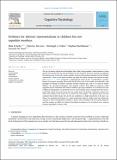Evidence for abstract representations in children but not capuchin monkeys
Abstract
The use of abstract higher-level knowledge (also called overhypotheses) allows humans to learn quickly from sparse data and make predictions in new situations. Previous research has suggested that humans may be the only species capable of abstract knowledge formation, but this remains controversial. There is also mixed evidence for when this ability emerges over human development. Kemp et al. (2007) proposed a computational model of how overhypotheses could be learned from sparse examples. We provide the first direct test of this model: an ecologically valid paradigm for testing two species, capuchin monkeys (Sapajus spp.) and 4- to 5-year-old human children. We presented participants with sampled evidence from different containers which suggested that all containers held items of uniform type (type condition) or of uniform size (size condition). Subsequently, we presented two new test containers and an example item from each: a small, high-valued item and a large but low-valued item. Participants could then choose from which test container they would like to receive the next sample – the optimal choice was the container that yielded a large item in the size condition or a high-valued item in the type condition. We compared performance to a priori predictions made by models with and without the capacity to learn overhypotheses. Children's choices were consistent with the model predictions and thus suggest an ability for abstract knowledge formation in the preschool years, whereas monkeys performed at chance level.
Citation
Felsche , E , Stevens , P , Voelter , C J , Buchsbaum , D & Seed , A M 2023 , ' Evidence for abstract representations in children but not capuchin monkeys ' , Cognitive Psychology , vol. 140 , 101530 . https://doi.org/10.1016/j.cogpsych.2022.101530
Publication
Cognitive Psychology
Status
Peer reviewed
ISSN
0010-0285Type
Journal article
Description
Funding: This project has received funding from the European Research Council (ERC) under the European Union’s Horizon 2020 research and innovation program (grant agreement No. [639072]). We acknowledge the support of the Natural Sciences and Engineering Research Council of Canada (NSERC), [funding reference number 2016-05552].Collections
Items in the St Andrews Research Repository are protected by copyright, with all rights reserved, unless otherwise indicated.

